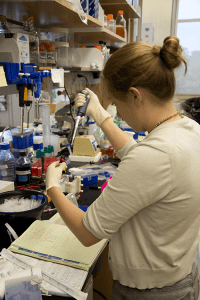 For my Kenan fellowship project, I interned alongside postdocs and graduate students in the lab of Dr. Brian Strahl at UNC-Chapel Hill where they are researching the hypothesis that, just like DNA, the proteins that organize and help replicate genes within the nucleus of the cell also function as a “code.”
For my Kenan fellowship project, I interned alongside postdocs and graduate students in the lab of Dr. Brian Strahl at UNC-Chapel Hill where they are researching the hypothesis that, just like DNA, the proteins that organize and help replicate genes within the nucleus of the cell also function as a “code.”
I learned how researchers isolate proteins from within bacteria cells so they could study how these proteins interact with enzymes and other proteins within the cell. Since these proteins play such an important role in DNA replication, understanding how they work may help us understand why unregulated cell growth occurs, and how we can combat cancer.
Gaining ‘Lab Cred’
By the end of my five-week internship, I was able to run an experiment all the way through, from cultivating the bacteria, to purifying the protein. Even more exciting, I was able to get awesome results that my postdoc mentor is planning to use in an upcoming paper. I never imagined that I would be able to achieve that.
Now that I have my “lab cred” I’m excited about doing research in the future. Understanding the process scientists go through every day to build successful experiments will help me design studies in education. When I think about the impact I want my internship experience to have on my students, a lot of things come to mind. I want them to learn about the reality of genetic research and how it is being applied to benefit natural and human life. I want them to get a sense of what it means to be a researcher.
Renaissance Thinkers
More than anything, though, I want my students to open up to the idea that just because they are good at one thing, doesn’t mean they can’t be interested in everything. I’ve been thinking back to my earlier ideas about crossroads thinkers who can combine scientific and artistic knowledge. Writing my curriculum proved to me just how difficult that can be!
While we can’t all be geniuses in the way of Divinci or Lovelace, we can all cultivate our curiosity and become Renaissance thinkers. By sharing my internship experience, I can introduce students to the novel idea that an English teacher can be interested (and successful!) in science. As a high school student, I remember wanting to take physics, AP Chemistry and anatomy classes, but I lacked confidence in my own abilities.
I want all my students to feel confident enough to do anything. I also want them to know that just because they don’t look like, or have the same experiences as others, they CAN do whatever they want to do.
2014-15 Kenan Fellow Michelle Hicks teaches English at Millbrook High School in Raleigh. Dr. Brian Strahl at UNC-Chapel Hill supported her Kenan fellowship and served as her lead mentor.